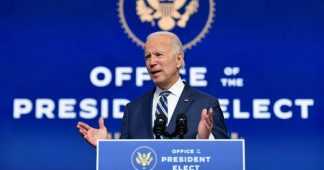For Scott Atlas, as for Republican governors like Ron DeSantis, Greg Abbott, Tate Reeves, and Kay Ivey, the human cost of our shredded public health system is a feature, not a bug.
By Gregg Gonsalves*
September 22, 2021
t the end of August, I wrote about the deficiencies in President Joe Biden’s initial response to the Covid-19 pandemic. At the beginning of September, the president announced a series of new initiatives that will tackle many, though not all, of these shortcomings. I am not positing a cause and effect here: I don’t think the president’s inner circle is reading my columns in The Nation to decide what to do. However, what is driving the Biden administration’s moves is reasonable scientific advice, and my comments here were largely framed within the existing scientific consensus of what we should be doing now. We can argue the specifics—and certainly still criticize—but by and large, “science is back” in 2021 (depending where you look, but more on that later).
It’s hard to remember—perhaps because I am trying so hard to forget—the sheer lunacy of Trump’s science last year: second-rate economist Peter Navarro’s campaign to put hydroxychloroquine in the drinking water (with help from my own institution’s Harvey Risch); the president’s ravings about bleach and ultraviolet light; and then there was Scott Atlas, the Rasputin of 2020. Though an actual physician, his training was in neuroradiology, not infectious diseases; until 2012, Atlas was a professor in his field of expertise at Stanford. After 2012, his relationship with the university shifted, and he became a fellow at the Hoover Institution, the conservative think tank loosely affiliated with the university, where he was a vocal opponent of the Affordable Care Act and pushed for Medicaid to become a bridge to private insurance.
But Scott Atlas’s claim to, well, infamy, was his embrace of the concept of herd immunity: the idea that Covid-19 was of negligible clinical significance for anyone but the elderly, and that—apart from sequestering the elderly from the rest of the population—public health restrictions were unnecessary. Rather than heed public health advice, Atlas claimed as many people needed to get infected as possible as quickly as possible to develop herd immunity and put the pandemic behind us. This was met with vociferous pushback from the medical and public health community, since “letting ’er rip”—letting the virus spread uncontrolled and thus allowing millions to get infected—also risked millions of deaths. Besides, actually sequestering the elderly and those with underlying conditions was nearly impossible given the sheer number of individuals in these categories. Atlas resigned his White House post on December 1, 2020.
I started to think about Atlas again over the past few weeks. As the Covid-19 epidemic has torn through the American South, I’ve been trying to make sense of it all. It’s easy to criticize Southern governors as ignorant, uninformed actors in the sheer catastrophe unfolding in the ICUs in the region. But then I remembered a passage in a book I read a while ago, by economists Daron Acemoglu and James Robinson, called Why Nations Fail. In it they examine how poverty happens across the world throughout history, arguing that poor countries are poor because those who have power make choices that create poverty. They get it wrong not by mistake or ignorance but on purpose. To understand this, you have to go beyond economics and expert advice on the best thing to do and, instead, study how decisions actually get made, who gets to make them, and why those people decide to do what they do.
What is happening in the American South is no accident. It is not born of ignorance or folly. It is a choice. Consider this comment in a New York Times article by Florida Governor Ron DeSantis: “Clearly the vaccines are keeping most of these people out of the hospital, but we’re not building the herd immunity that people hoped,” he said (emphasis mine). Herd immunity. We’re back to Scott Atlas, who would be a footnote in epidemic history—except for the thousands of deaths for which he is responsible. DeSantis was an early adherent of the notion of herd immunity espoused by Atlas and a group of scientists funded by the libertarian American Institute for Economic Research. Governor DeSantis and his colleagues in the South genuinely think they are doing the right thing. Their persistent, horrific quest for herd immunity confirms preexisting biases about the role of the state in our lives—the less the better. In the People’s Temple of the Sunshine State, this faith has led the people’s leader to hand out the Kool-Aid to his own citizens, leading them to their own deaths.
Remember, before Covid-19 the South was already the least healthy region in the country: People there lived shorter lives, with much higher rates of chronic conditions. The South was the epicenter of the American AIDS epidemic—and rife with other infectious diseases. Yet, except for Louisiana and Arkansas, most of the states in the Deep South refuse to expand Medicaid—depriving many of their citizen of access to medical care that can make their lives better. While that, too, may be rooted in a libertarian, small-government impulse, writers like Jeneen Interlandi of The New York Times have made a compelling case that decisions to restrict access to health care in the United States have everything to do with race. This is where American libertarianism meets white supremacy.
Conservatives have worked hard for decades to bring us to this very moment, always implying that the safety net they were shredding—the basic fundamentals of public health they’ve been chipping away at over the past year—were benefiting someone else. Someone darker. Someone less deserving. Before Atlas was pro-Covid, he was looking to roll -back the ACA and dismantle Medicaid.
Lest there be any doubt, let’s take a detour to another aspect of American health care and public health: abortion and reproductive health. The new ban on abortion in Texas was crafted carefully to make it difficult to challenge. This was a considered, deliberate approach, which will deprive thousands of women of the care they need, but first and foremost women of color in the state. As Thomas Edsall wrote in the Times recently, abortion has never really been just about abortion but always tightly linked with racist ideologies. Edsall offered this quote from Richard Ballmer at Dartmouth: “Opposition to abortion became a convenient diversion—a godsend, really—to distract from what actually motivated their political activism: the defense of racial segregation in evangelical institutions.”
This is our post-pandemic future—and it is bleak. When the next virus arrives here, we will be even weaker than we were before 2020. The trajectory of the pandemic in the United States has many drivers and we cannot lay all the regional variations at the feet of our politics. However, the toxic stew of Trumpism, white supremacy, and small-government-at-all-costs mania—the embrace of pseudoscience—has made things much worse.
Watching developments over the past few weeks and months has, frankly, frightened me. Now Republican governors are going after vaccine mandates—though all their states have long had them for preventable childhood illnesses and for sectors of the workforce who interact with the sick and dying (e.g., health care workers). When Amy Coney Barrett assured us that the Supreme Court isn’t just a bunch of partisan hacks, what we heard was the Lady Macbeth of the judiciary trying to rub out the stain of the past few years’ judgments, even as she feels compelled to acknowledge it, in public, as real. With such partisanship now in place, might we see the striking down of long-held precedents on vaccine mandates and other public health measures? We’re already seeing state after state enact new laws to constrain public health authority.
There has been a thread of the national conversation that blames public health for being its own worst enemy. The charge is that our failure to communicate clearly over the course of the pandemic has undermined public trust—and that much of what is happening now in terms of the attacks on public health is self-inflicted. Admittedly, there were significant failures in public health communications over the course of the pandemic, and there is huge room for improvement in this regard. However, separating the signal from the noise is harder in the context of state-sponsored misinformation and the deliberate manipulation of public sentiment for political gain.
But let’s head south again. The recent attacks on public health, the willingness on the part of Ron DeSantis, Greg Abbott, Tate Reeves, Kay Ivey to defy standard public health practice—even as they see their constituents suffer—has its roots in a deep ideological commitment. This isn’t about the CDC’s shifting mask guidance, or about the belated acknowledgement of airborne transmission of the virus. This isn’t what matters to these leaders. And it’s simply willful ignorance to suggest that “bad communication” is at the root of what is happening now. As Naomi Klein notes, every catastrophe is an opportunity.
The pandemic has enabled these leaders to pursue policies they have wanted to push way before SARS-COV-2 had entered the scene. As the poet Anne Sexton said of self-destruction in another context: “Suicides have a special language. Like carpenters they want to know which tools. They never ask why build.” The GOP is looking for ways to undermine access to health care, public health regulations and programs—the whole already-frayed safety net. Right now, we need a massive investment to revive public health in America. We were in dire shape before the pandemic; now we have one party that is hell-bent on destruction and the other party, for all its welcome departure from the Trump administration’s insanity, thinks it can McKinsey its way out of a crisis, ignoring the fundamental weaknesses in our public health system.
Scott Atlas may be gone, but what he helped bring to pass must give him some measure of satisfaction. And as for the deaths of those who might still be alive if they had gotten vaccinated instead of being told they were defending freedom? In my mind’s eye, I see him shrugging it all off, telling us blithely that you can’t make an omelet without breaking some eggs. For Dr. Atlas and the politicians who share his views, the chilling fact may be that all of this has been worth it
* Nation public health correspondent Gregg Gonsalves is the codirector of the Global Health Justice Partnership and an assistant professor of epidemiology at the Yale School of Public Health.
Published at www.thenation.com
We remind our readers that publication of articles on our site does not mean that we agree with what is written. Our policy is to publish anything which we consider of interest, so as to assist our readers in forming their opinions. Sometimes we even publish articles with which we totally disagree, since we believe it is important for our readers to be informed on as wide a spectrum of views as possible.











